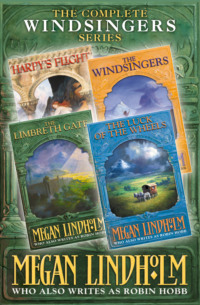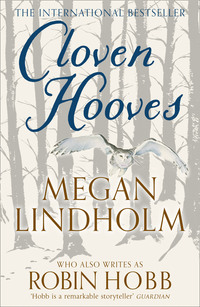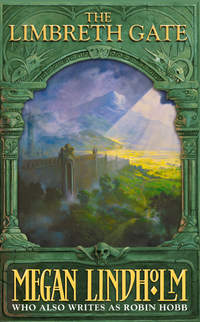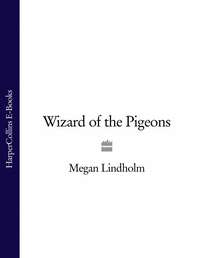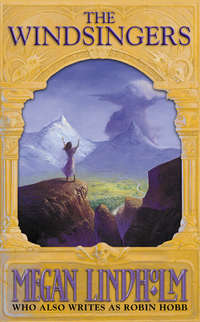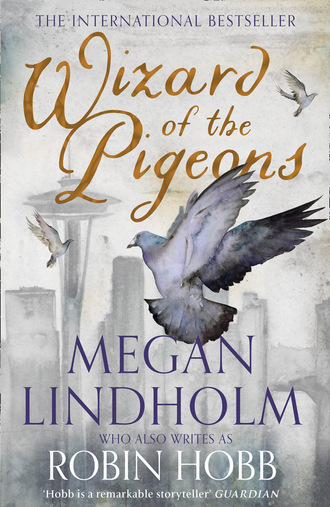
Полная версия
‘Your den is the storm’s eye,’ she said without preamble. ‘Whatever it is, it’s coming for you. You want to tell me about it, so I can at least warn the rest of us?’
Wizard shook his head, trying to breathe. ‘I can’t. Not because I won’t, but because I don’t know what you’re talking about. I mean, I don’t know anything about it. Not exactly. Anyone with any magic at all can tell that there’s something hanging over the city. But I don’t know what it is, and –’
‘It’s coming for you.’ Cassie’s voice brooked no denial. There was a chill in it that was not the absence of feelings, but the hard edge of emotions kept in check. ‘Whatever it is, it’s yours. If it has a balancing point, only you will be able to reach it. The sooner you stop it, the better for us all. But you can’t stop it until you give it a name. Do you know what I’m saying?’
‘I know you’re scaring the hell out of me.’
‘Good. Then you do understand. Be on your toes. Keep your rules.’
‘I do. You know I do.’ He added the last reproachfully.
‘Yes. As I keep mine. I suppose I know that best of all.’ There was regret in her words. It stung him.
‘Cassie. I’m not holding out on you. If I knew anything, wouldn’t I tell you?’
She leaned back on the bench, not speaking. Silence fell between them. Thin Seattle sunshine, a mixture of yellow and grey, cautiously touched the uneven paving stones. A sea bird flew overhead, too high to be seen against the sun’s glare, but its mournful cries penetrated the city sounds to echo in Wizard’s soul. A terrible foreboding built within him, forcing words out.
‘There was something, once. Like a hunger, an appetite. Something like that. I don’t remember.’
‘It didn’t have a name?’
‘It was grey,’ he admitted uneasily.
‘So it was.’ Cassie sighed heavily. ‘So you’ve told me. Listen, Wizard. If you needed help, you’d come to me, wouldn’t you?’
‘Who else would I go to? But you’ve got something backward, Cassie. I heard about the grey thing from you.’
‘You did? Well, if you say so, it must have been so. Just remember, Wizard. If you need help, I’m your friend. Just let it out that you need me, and I’ll come to you. And…it doesn’t have to be danger. If you just want some company, that’s fine, too. If you just want to see me…’
‘If I need a friend. I know that, Cassie.’
She lifted a slender hand that hovered uncertainly for a moment before falling to gently pat the bench between them. ‘Listen,’ she said suddenly. ‘You want a story? I’ve got a story for you if you want it.’
‘Sure,’ he lied, covering his reluctance. He never liked what Cassie’s stories did for him.
Cassie settled in. She took a breath, and after a moment began, ‘Once there was a war, where a guerrilla force was fighting an army from across the seas that was struggling to keep a government in power.’
‘If you mean Viet Nam, say Viet Nam,’ he said with a bravado he didn’t feel.
‘I didn’t say Viet Nam, so shut your mouth and listen!’ When Cassie was interrupted, she was as fierce as a banty on eggs. ‘There was an old man in a village. He had an old rifle, and whenever the foreign soldiers came near, he would fire a few shots in the air. This was because the guerrilla forces expected him to snipe at the foreign soldiers. He could not bring himself to do that. So he would fire a few wild rounds at nothing in particular, and the guerrillas would hear the shots and be satisfied he was doing his part. The foreign soldiers understood. Sometimes they’d even let off a burst or two, to make things sound lively. And the old man’s family slept safely at night.
‘But into this there came a very young foreign soldier who didn’t understand the rules of the game. So when he saw the old man fire the old rifle, he took him seriously. He killed him.’
Wizard’s mouth was dry. Cassie had stopped talking as suddenly as the jolt of a rear-ended vehicle. He sat silently, waiting for more, but she said nothing. After a moment she bent her head to dig through her purse, and offered him a Lifesaver.
‘The moral?’ he asked, taking one. His voice cracked slightly.
‘There isn’t one.’ She spoke to the roll of candy she was peeling. ‘Except that the next week, the guy sniping at them from that hamlet wasn’t shooting into the air.’
Another electric jolt from those incredible eyes. He withstood their voltage, gripping the edge of the bench to keep his hands from shaking. She rose and walked away, leaving as silently as she had come. He tried to watch her go, but the sunlight was making his eyes water, and it seemed that she just melted into the passing foot-traffic.
‘Cassie,’ he sighed softly, feeling empty. And wondered why.
CHAPTER THREE
Wizard came awake. His blanket, tucked so carefully under the edge of thin grey-and-white striped mattress, had pulled free. A large damp tomcat had insinuated itself between the flap of the blanket and the small of his back, to curl in contented sleep. November’s chill damp of night infiltrated his unheated room; the cold air condensed on his unprotected back. But neither the cat nor the cold had awakened him. Behind his closed eyelids, his mind had clicked into instant awareness. Something was out there.
His fingers tightened on the fraying edge of the blanket, his knuckles white. Without opening his eyes, he turned his concentration in, to hold his breath to the steady cadence of sleep and keep his strung muscles from a betraying twitch. No one, nothing, could have known that he was now awake. Even Black Thomas, curled serenely against him, was unaware of his watchfulness. Reassured that his personal perimeter was still intact, Wizard cautiously deployed his senses.
A subtle wrongness pervaded his room. To his nostrils came the familiar mustiness of the dank walls, the city cat stink like damp wool, and beyond that the cheesy odour of pigeon droppings. A light rain had fallen on Seattle since he had drowsed off. It had cleaned the metropolitan air and cooled it, the falling drops pressing down the fumes of the cars and buses and rinsing the oily gutters. Beneath the streetlamps, the drops would sparkle on the green glass sides of discarded wine bottles. He could find the sparkle breaking into a thousand night sequins beneath a bench in Pioneer Square. But all of this was absolutely and totally as it should be. The very rightness of it stiffened his spine with dread. Whatever it was, it was very clever.
But sound would betray it. He smiled without a twitch of muscle. Hearing was his gift, Cassie had told him. His ears could pick up the tortured hum of a fluorescent light, could sense the shop-lifting detectors that framed the doors of so many stores these days. He could feel the rumble of a diesel truck in his skull when it was yet blocks away. He passed his power to his ears and let them quest outward. But his ears were filled with his own deep breathing and the rising thunder of his heart. Be still! he bade it angrily, but it would not heed. Danger pressed all around him, waiting for such an internal betrayal. Fear soured his stomach, sending his heart thudding high in his chest, hammering against his throat, making his pulse leap. He had to waste precious strength and time by turning his power on himself, to quiet his fearful body. He gave his heart a slow count and repeated it until it could hold the rhythm of a natural sleep. His lungs sighed in harmony. Secured, he peered from his position, listening.
There was the whoosh and hiss of traffic on Jackson and Occidental Avenue South. Less traffic than usual, far less than on a King Dome night, and it was moving cautiously over the dampened streets made treacherous by a slightly suspended film of oil. He could hear the rainbow arching of spattering water as fat tyres spun past. Subjugated to the traffic sound was the gentle creaking and grumbling of the old building itself. But these normal groanings he knew as well as he knew the thump and rush of his own blood. He blotted these sounds from his consciousness and listened anew.
He listened for the halted footstep, for the creak of sagging floor boards under unaccustomed weight. He listened for the whisper of shirt fabric against jacket lining as the intruder breathed silently in the dark. He hoped for an unwary sniff, for the catch of breath in a nervous throat. But he heard only the breathing of himself and Black Thomas, only the flick of the old tom’s ear as a nocturnal mite nibbled.
So slowly it could scarcely be called a movement, Wizard eased his lashes open. He bared the tiniest slit of eyeball, too narrow a gap to glitter in the darkness. In his swath and huddle of blankets, his chin tucked to his chest, his eyes were pits of darkness. His pupils adjusted to the room.
Horror clutched at his throat.
When he had pinched out his final candle, his cardboard and blanket screen had been perfectly adjusted across the window. The blanket was a recent addition, replacing three old sheets that had previously bolstered the cardboard’s tattered morale. Wizard had stretched the blanket tight across the window frame and fastened it in place by silently pressing tacks gleaned from bulletin boards through the blanket and into the wooden sill. From outside the building, the cardboard appeared to be still wedged in place inside the cracked window where it had been taped many years before. Within, the blanket supported it firmly against the pigeon-streaked glass.
His heart foundered as he remembered the blanket had been a gift, freely given. Cassie had taught him how to be open to such gifts. He had been standing by the Goodwill drop box when the woman in the blue Chevy drove up. As she opened her car door and picked up the brown paper sack from the seat beside her, he had smilingly approached her, asking, ‘Would you like to give that to me?’ She had nodded, pushed it into his hands, and driven away.
Within the bag he had found some infant clothing, a Johnny-Jump-Up infant swing, a worn pair of hunting boots too small for him, and the neatly folded blanket. It was dark blue, of thickly woven woolly stuff, with only two worn spots. But it had been a gift. Not all gifts were given to bring joy to the receiver. At the time, he had felt the blanket had been sent to him, but not for his bed. The stretched sheets, even layered three deep, still permitted a streaking of his candlelight to escape. The blanket would seal him in, protect both his light and his darkness, and shield him from the grey city-night outside. When he had put it up, it had baffled the light, sealing in every speck and ray. Not one fingering beam of the city-night seeped in. He had slept in safety.
And awakened to terror. His cardboard had been wrenched clear of his window to lie atop the clotting puddle of blanket on the gritty floor.
The cracked window was not transparent. Rising street dust and grime had given it a milky wash. Stalactites of pigeon droppings graced it à la Jack Frost. The recent pattering of rain against it had smeared it more, making it impossible to see out. But the ghostly black-grey that passes for night in the city seeped in, making shadows that oozed from the edges of his possessions and slunk from beneath the brick and board shelves.
A smear of harsher light in the lower left corner of the window was flung from the vulturing streetlamps of South Jackson. The light striated across the cracked window, destroying even his memories of the blessed empty darkness of true night. Sweet night of star-specked skies and tree-breathed air had been replaced by a crouching greyness that emanated from the city. It came as much from the gutters and dumpsters as from headlights and streetlamps. It was more than the fogging breath of huddled winos and the grey puffing of exhaust. It was not inanimate.
Wizard kept his breathing steady, but from the skin in he trembled. His heart longed to gallop, his lungs screamed for more oxygen, faster. He smothered them, choking on fear, and tried to think.
It was grey. And now that he so desperately needed to recall everything he had ever known about it, he could remember nothing. Nothing. Except…Mir. A name, he wondered, and chased the wonder away. No time for it. All he could do right now was to defend. But at least it thought he was sleeping. He reined his power back, risking no contact. It wanted him. He didn’t move. If he trembled, if he flinched, if his power just brushed it, it would suck at him. It would drag him from his bed to the window. It believed he still slept; he felt its tenuous probings. It sought to find his dreams and slip in the unguarded back door of his mind. Not again. Like the shock of a bright flashlight in the eyes, an unbidden memory came to him. Once it had forced him to come to it. It had never forgotten its triumph over him. But Wizard had. He could not keep the memory, let the force of the recollection assault him. He couldn’t let it weaken him. If he harked to that memory, it would sense his awareness. Without a reason to hover and sneak and wait, it would leap in and fasten itself to him. Right now, it hunted his dreams.
It pressed against the cracked window pane. He saw the glass bend with its weight, heard a slight scratch as the rough edges of the crack grated against each other. His first night in this room, he had pressed the edges of the glass back into smooth alignment. Now he saw lengthening cracks race across the glass to meet the dried putty in the frame with a final click. The tip of the broken wedge of glass began to veer slowly in. It separated from the window, swinging on the putty edge like a hinge, pointing at him like an accusing finger.
Wizard held himself in check. He had a chance, if he kept his defences tight. Let it think he slept. Let it pray and peer for the easy way into him. He could wait it out. He poised his power, waiting for it to extend itself into the room. Let it think he was defenceless; he was ready for it.
Black Thomas betrayed him. Some questing tendrils of the Grey’s power must have brushed his feline senses. From a curled ball of damp fur and warmth, the cat catapulted into panic. His hind legs and razor claws flashed down Wizard’s bony back. The black tom bounded from the mattress to crouch in awful fury between Wizard and the thing at the window. Deep growls scraped from Black Thomas’s throat as his tail lashed defensively. He did not know what threatened him, but he defied it.
‘Thomas!’ Wizard warned, too late. The thing outside the window bellied and gusted in its power, delighted at the cat’s foolish bravery and Wizard’s wakefulness. Wizard flung up his power as he heard the gathering forces race down the long alley beneath his window and bellow through the broken pane. Wizard held his position, but poor Thomas could not. It was too much for any cat. He broached Wizard’s defences, springing out from that protection into the heart of the oncoming malice. In terror he flung himself toward the connecting door and the other room. That way had always been escape, but now escape was the bait in the trap. Mir roared menacingly into the room. A wedge of glass leaped from the broken window. It sliced the foot off the fleeing tom’s right hind leg as easily as a knife slices butter.
The moment was frozen and offered to Wizard. He stared at the slicing glass falling intact to the floor. The small black foot bounded and tumbled to a stop. It twitched on the floor like a witchery charm. Yowling terror and spraying blood, Black Thomas fled to the other room and down the fire escape. Impulsively Wizard reached after him. He sealed off the pumping veins in the stump of the leg as the cat ran. But grey Mir had known he would reach after the cat. With a roaring of triumphant mirth, it fell on him.
It closed on him like a fist. Wizard balled himself into a tiny hard nut in its grasp. It might hold him, but it would not have him.
The winds of eternity screamed past his soul. Wizard shivered, then shuddered in their chill. They forced his eyes open, though he had not closed them. Tears streamed from the corners of his eyes, streaking into his hairline. He was peering down through a hole in the sky. In a barnyard, three boys were killing chickens. He fell into them.
The dark-haired boy holding the chicken’s feet did not look at what they were doing. He looked away from the bird, wincing each time the axe bit into the chopping block beneath the bird’s outstretched neck. He flung the beheaded body from him, his lips pinched in a tight white line. Then he stooped down to the gunnysack he held shut with one foot. He reached into the struggling bag to extract another squawking victim. He drew out a black and gleaming rooster. He knew this one. He had been a multicoloured chick, with dark stripes on his head and wings. The dark-haired boy remembered a morning when he went out to feed the stock, and discovered that this chick and one other had gone into the wrong nesting box at night. The mother hen had taken the other chicks into another nesting box and covered them. When he had found the two chicks, they were cold. Their little feet bent stiffly against his fingers. Their eyes were lidded with white covers. He had stuffed them inside his shirt so his little sister wouldn’t see them and cry. The feel of their cold fuzziness and their scratchy little legs had given him the creeps. Dead chicks against his bare belly. He had three more pens of chickens to feed. By the time he was pouring the feed in the second pen, he thought he felt a twitch. When he finished the third pen, there was a definite stirring inside his shirt. He had crouched in the dung and straw to lift the chicks out of his shirt and breathe on them. They had revived in his hands, and soon their earsplitting peeps had their mother flying in a fury against the mesh of her pen. He returned them to her. The little hen chick blended right in with the rest of the flock, but the striped one was always easy to spot. The dark-haired boy placed the shining black rooster on the chopping block. He gripped the two yellow legs firmly, letting the young spurs dig into his palms. He turned away and clenched his jaws.
A rusty-haired boy with freckles was holding the heads. He had a method of pinching the heads firmly on the ear spots and drawing the necks long and straight until the neck feathers stretched flat. He had never killed chickens before; his speckled face was glistening with excitement. Some chickens were silent as soon as he stretched them out on the block; others kept squawking even as the hatchet fell. Then, when they threw the bodies aside, it was the bodies that still gobbled and honked as they jigged about. The heads were voiceless as they lay on the block, their beaks opening and closing soundlessly, the eyelids still blinking as if to focus the vision of a bodiless brain. He wondered what they saw. The solitary heads reminded him of goldfish gaping on a table top. He brushed them from the block onto the short grass, and found it sort of a shame when specks of dust fell on the clear eyes that still blinked and puzzled. His hands and forearms were wet with chicken blood. No matter how fast he jerked his hands back, the jumping gout of blood splashed him. Then, when the bodies hit the ground, there was no telling where they’d stagger and run. Two had crashed right into him, and one had run right between his legs, squirting blood all over his socks and sneakers. Wait until the other kids saw it! Geez, he wished he could live on the farm with the cousins. They had only done four chickens, and already his ribs ached from laughing. His dad had once told him that chickens were the stupidest creature God ever invented, and now he knew why. He gripped the black rooster’s head firmly and pulled its neck out straight. ‘I got dibs on the tail feathers!’ The lush red comb flopped over his fingers; the bright yellow eye winked at the falling hatchet.
A stocky boy wielded the tool; its handle was slick with blood. As the eldest son, he was supposed to be careful enough to be trusted with it. A maniac smile sat upon his lips and he laughed at Red’s gross jokes. Under his striped t-shirt, his stomach felt cold. At least this time he was doing it out under the sun, in the open where it all could disperse afterwards. In winter, he had to do it alone, in the straw-shed, lit by a single bulb turned on with a pull string. No matter how he swept the floor afterwards, there was always the wash of dark blood across the old boards, the stray wet feather caught in the cracks in the floor or snagged around a loosened nail. It was never warm in there, even on the hottest days. In winter it was a dark and comfortless place, feeling more like a dank cave than a wooden shed. He did not like to go into the straw-shed, even in summer. He always left the wide door open, and hurried in and out again, fleeing with the heavy bale thumping against his legs.
Once he had tried to confide in his cousins. ‘Don’t you feel it in there?’ he had whispered to Red one night. ‘Like clusters of little spirits, little feathery ghosts wanting to know why you fed them and cared for them and then smacked their heads off one day? Can’t you feel them?’
‘Chicken ghosts?’ his cousin had hooted, and must have spread the joke to the neighbour kids, for the next night he awoke to drawn-out moans outside his bedroom window: ‘Cluh-uh-uh-uh-cluck! Cluh-uh-uck!’ But the mockery could not quell the fear or the guilt. He chopped their heads off because his dad was busy and he was old enough and his mom said that if she could do the dressing out, he could do the chopping and the plucking. Go free, Rooster Spirit, he thought, go up into the blue sky and spread out across the pasture. After he had finished killing this batch of chickens, he would split up the chopping stump into firewood and stack it to be burned. The rain would wash the blood down into the soil, the wind and wild birds would carry off the stray feathers. Nothing would be left for the forlorn little souls to congeal around. He lined up his hatchet carefully and brought it down so hard that it wedged firmly into the chopping stump, trapping a few bright feathers with it.
One of them was you, Mir accused, but Wizard still refused to answer. He had been trapped that way before. Past guilt was better forgotten, lest it be savoured. He blinked his eyes and was three places at once.
The eldest son had just finished all the plucking. The bright blue sky of early afternoon had waned into a greyness that promised rain. He pulled the black plastic garbage sack full of feathers free of the plastic trash bin and dragged it around the chopping block. Kneeling, he searched through the grass for the discarded heads. Blood had smeared and spoiled the bright plumage. Some had eyes or beaks open; others were closed. He did not flinch from them, but he picked them up as delicately as sleeping butterflies and dropped them in the sack. Rural trash pick-up would take away the heads and the feathers. The rest could be cleaned by sun and rain. But he found only twelve heads. Scour as he might the grass, two heads were missing. He cursed softly to himself. If his little sister found one and screamed, there would be hell to pay. If the dog ate one and got sick, he would get a licking for it. A few stray drops of rain spattered on his back. He gave it up. He knotted the plastic sack tightly shut and toted it over to the grey metal cans.
The dark-haired boy slipped silently out of the kitchen. Deep in his denim jacket pocket were the bright tail feathers that Red had snatched from the dead rooster’s body. In his other pocket was the rooster’s head, wrapped in a paper napkin. He hurried from the yard before Red could notice the theft of the tail feathers. He’d have to hurry; it was going to rain soon. He crossed the pasture, avoiding the moist brown cow flops, slipped through a barbed wire fence, crossed a survey cut, and fled into the woods. He followed a rabbit trail that wound beneath the trees until he came to a stand of spruce trees. Dropping to his knees, he crawled under the low swoop of outer branches until he came to a place in the centre of the thicket. He could see the sky, and a tiny patch of sunlight reached the ground. This was his best place, his sitting and thinking place. He used a stick to brush away a year’s layer of spruce needles. He dug down into the rich humus, the ripe smell of summer earth rising past him. He dug until he could thrust his entire hand and wrist into the hole. That was deep enough. He took the head from his pocket and unwrapped it to look a last time into the golden-orange eyes. But death had spoiled their colour; he could not bring himself to try and close the lids. Instead he rewrapped it carefully in the paper napkin and placed it in the bottom of the hole. He buried it, squishing the earth down firmly with a clenched fist. When the hole was packed full, he sprinkled a layer of spruce needles across the scar. The tail feathers he stuck up in a small circle around the tiny grave. They kept falling over, but he patiently stood them up again and again, until the circle was complete. He never spoke as he did it; he made no sound at all. He bowed his head gravely to the circle of feathers and backed out of the grove, the trailing branches scratching his back and neck. He never went there again.


